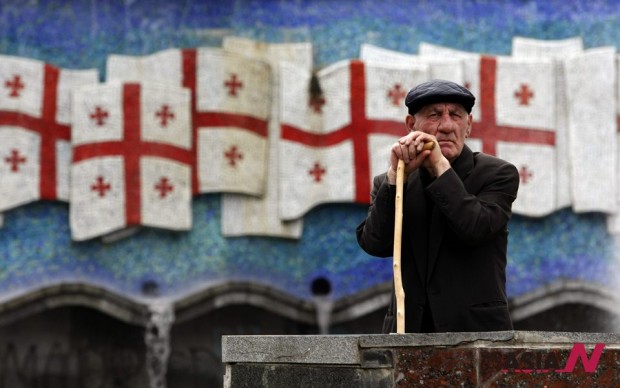Pivotally located Georgia waits for foreign investors

A Georgian WWII veteran visits WWII memorial during Victory Day celebration in Tbilisi, Thursday, May 9, 2013. Georgia celebrates the 68th anniversary of the Soviet Union's victory over Nazi Germany on May 9. <AP Photo/ Shakh Aivazov>
2014 Independence Day of Georgia
The Independence Day of Georgia on May 26, commemorates the Act of Independence of 1918, which outlined the main principles of the nation’s democracy and established its first Democratic Republic.
This day carries immense historical importance for Georgia’s statehood as it laid grounds, back in 1918, for reemergence of Georgia’s European identity, revealing inherent commitment of the Georgian people to the goal of building a democratic nation.
Georgia is located on the Eastern border of Europe between the Black Sea and the Caspian Sea. Its first unified kingdom was established in the 4th century BC. Christianity was adopted in 337 AD. Georgia has its own unique alphabet that can be traced back to the 4th century BC.
Present-day Georgia is a dynamically developing democratic state. Internationally renowned comprehensive anticorruption, administrative and economic reforms, initiated in 2004, resulted in the streamlined bureaucracy, minimized administrative corruption, improved living standards and business friendly environment. Major cuts in both tax rates and tax categories promoted economic activities and steady GDP growth that averaged annual 7% throughout the last decade. Economy proved to be resilient to external shocks with minimal loses during the global financial crisis. According to the government agencies and international financial institutions, Georgia’s economic growth is expected to exceed 5% in 2014. Today Georgia is one of the least corrupt and most business friendly destinations globally according to the reputable international organizations such as the Transparency International and the World Bank. It maintained a stable credit rating (‘BB- outlook Stable’ by FITCH and Standard & Poor’s), moved up to 8th in the world in terms of World Bank 2014 “Ease of Doing Business” rating , and 22nd in terms of 2014 Heritage Foundation “Economic Freedom” rating.
The present government of Georgia elected in 2012, declared an unwavering commitment to strengthen the democratic institutions and achieve greater decentralization of executive powers by a gradual shift from electoral democracy to institutional democracy. Its political agenda focuses on social and human rights issues.
Meanwhile, the issue of Georgia’s territorial integrity remains a top priority on our agenda. In August 2008, Russian military aggression resulted in occupation of the inalienable Georgian regions of Abkhazia and Tskhinvali region/South Ossetia. Despite Georgia’s efforts to normalize relations with Russia in areas where progress is achievable, Russian forces have nonetheless becoming more active in reinforcing barbwires and other artificial obstacles along the occupation line, thereby displacing the population living in the adjacent areas and violating fundamental human rights of people living in and outside the occupied territories. Our request is legitimate and therefore firm: Russia should fulfill the Six point Ceasefire Agreement of 2008, withdraw its troops from Georgia’s occupied regions and ensure full access of international monitors to these territories.
Georgia’s foreign policy priorities and the choice of its people remain resolute and clear – full integration into EU and NATO. The EU-Georgia Association Agreement, with Deep and Comprehensive Free Trade Area as its integral part, was already initiated in 2013, and is expected to be signed by June 2014. Georgia is firmly on the path of NATO integration and is looking forward to the next NATO summit to highlight the progress achieved along the route towards membership with the Alliance.
Georgia strives to diversify its economic and political partnerships, and to that end its interaction with the ROK is considered strategic. 2012 marked the 20th Anniversary of establishment of our diplomatic relations. In 2013, we signed our first bilateral intergovernmental treaty on visa waivers for the holders of diplomatic, official and service passports, followed by a cooperation agreement in the field of maritime transport. This year, cooperation agreement in the fields of culture, education, arts, youth and sports will be signed in Seoul. It will coincide with a Caucasus Cultural Festival, where the Korean public will have the opportunity to enjoy exciting Georgian folk dance performances and a fascinating photo-exhibition about Georgia.
To facilitate the people-to-people relations, Georgia’s Embassy in Seoul helped Korean universities establish partnership ties with Georgian counterparts. In this context the Korea Foundation provided literature and dispatched teachers of the Korean language to Georgia. In its turn, our Embassy supports Korean universities and public libraries by donating Georgian books and English literature on Georgia. In the last couple of years, the number of Korean visitors to Georgia significantly grew. To further promote our country, the Georgian National Tourism Administration is sending 8 leading Georgian tour-operators to the annual Korea Travel Fair – KOTFA 2014, to be held in Seoul, on May 29-June 1, 2014.
Georgian Embassy invests great efforts to introduce Georgia’s investment opportunities, business-friendly environment, and liberal trade regimes to the Korean entrepreneurs. With the invaluable support of the Federation of Korean Industries (FKI), this April Embassy organized a seminar on “Investment Opportunities in Georgia”, attended by 25 Korean corporations. A Memorandum of Understanding was signed between the FKI and Georgian National Investment Agency. Promotion of business and trade relations is yet another area of mutual interest. Korea already imports Georgian wine and other products, and we believe that with concerted efforts high-quality Georgian products will also appear on the Korean market.
Georgian Embassy in Korea will continue to further reinforce cordial ties between Georgia and ROK in political, economic, cultural as well as people to people sphere and open ways for Korean tourists, students, businessmen, sportsmen, representatives of media, culture and arts to discover Georgia.






















































